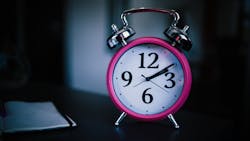Hit the sleep ‘sweet spot’ to keep brain sharp
A multiyear study of older adults found that both short and long sleepers experienced greater cognitive decline than people who slept a moderate amount, even when the effects of early Alzheimer’s disease were taken into account, according to a news release from Washington University School of Medicine in St. Louis.
The study was led by researchers at Washington University School of Medicine in St. Louis and Barnes Jewish Hospital.
Poor sleep and Alzheimer’s disease are both associated with cognitive decline and separating out the effects of each has proven challenging, the university said.
By tracking cognitive function in a large group of older adults over several years and analyzing it against levels of Alzheimer’s-related proteins and measures of brain activity during sleep, the researchers generated crucial data that help untangle the complicated relationship among sleep, Alzheimer’s and cognitive function.
Brendan Lucey, MD, Associate Professor of Neurology and Director of the Washington University Sleep Medicine Center, said, “Our study suggests that there is a middle range, or ‘sweet spot,’ for total sleep time where cognitive performance was stable over time. Short and long sleep times were associated with worse cognitive performance, perhaps due to insufficient sleep or poor sleep quality.”
For this study, the participants also provided samples of cerebrospinal fluid to measure levels of Alzheimer’s proteins, and each slept with a tiny electroencephalogram (EEG) monitor strapped to their foreheads for four to six nights to measure brain activity during sleep.
In total, the researchers obtained sleep and Alzheimer’s data on 100 participants whose cognitive function had been monitored for an average of 4 1/2 years. Most (88) had no cognitive impairments, 11 were very mildly impaired, and one had mild cognitive impairment. The average age was 75 at the time of the sleep study.
The researchers found a U-shaped relationship between sleep and cognitive decline. Overall, cognitive scores declined for the groups that slept less than 4.5 or more than 6.5 hours per night — as measured by EEG — while scores stayed stable for those in the middle of the range. EEG tends to yield estimates of sleep time that are about an hour shorter than self-reported sleep time, so the findings correspond to 5.5 to 7.5 hours of self-reported sleep, Lucey said.
The U-shaped relationship held true for measures of specific sleep phases, including rapid-eye movement (REM), or dreaming, sleep; and non-REM sleep. Moreover, the relationship held even after adjusting for factors that can affect both sleep and cognition, such as age, sex, levels of Alzheimer’s proteins, and the presence of APOE4.
